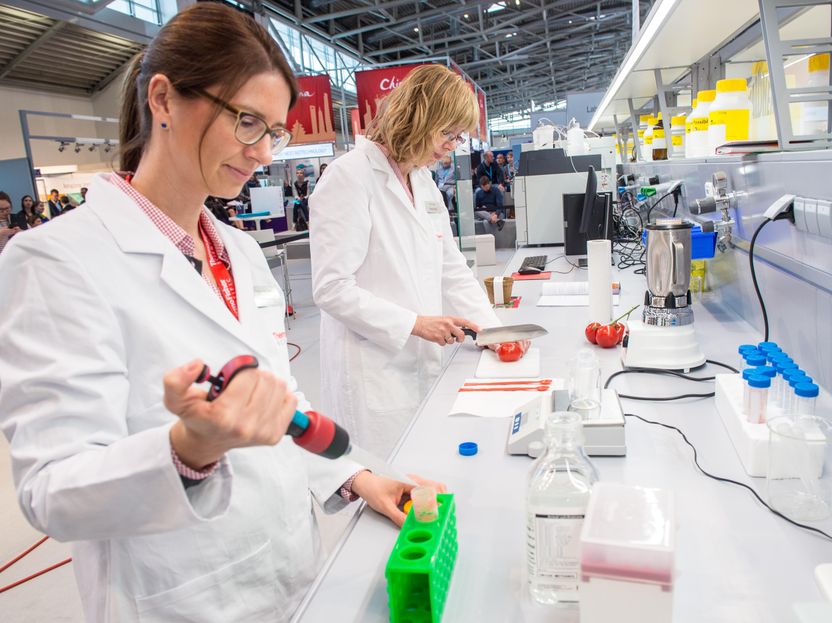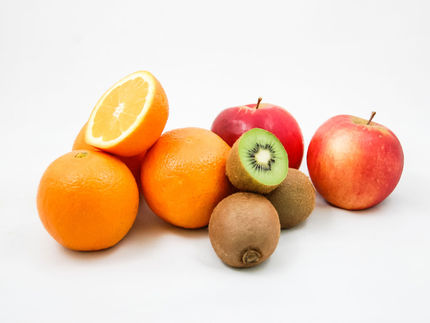analytica 2022: Analytics that benefit consumer and environmental protection
Does your mineral water contain nanoplastics or other pollutants?
Is that asparagus really local? Has the honey been diluted with cheap sugar? “analytica provides food inspectors with all the tools they need to answer these questions quickly and reliably,” says Armin Wittmann, analytica Exhibition director at Messe München. At the world's leading trade fair for laboratory technology, analytics and biotechnology, which will be held in Munich from June 21 to 24, more than 50 exhibitors will showcase innovations in the field of food analytics and safety. With nearly 70 exhibitors, environmental analytics will be another focal point. Because contaminants often enter our food from polluted waters and soils, food and environmental analytics are closely linked.

Messe München
New contaminants: nanoplastics and PFAS
Environmental laboratories were initially the only ones investigating micro and nanoplastics, but food analysts are now involved, too. Recently, the tiny particles have even been detected in our blood. In addition to their composition, the size and shape of the particles also play a role in their impact. FT-IR and Raman microscopes combine chemical analytics and imaging to simultaneously determine all parameters. The latest on these and other methods will be presented at the analytica’s Nanoplastics session (June 22 from 09:30 to 11:30 in ICM/Hall 4b). analytica exhibitors such as Thermo Fisher, Bruker, Agilent, Horiba, Renishaw and Keyence will present the relevant equipment.
Perfluorinated alkyl substances (PFAS) are also gaining more attention. The extremely long-lasting chemicals, found in products ranging from parchment paper to outdoor clothing, have already been found in a variety of foods. At analytica, Gerstel will present an automated analysis system that can detect as little as a few nanograms of PFAS in a liter of water. Many other analytica exhibitors, including Agilent, Analytik Jena, Merck, Waters and Shimadzu, have customized instruments for PFAS analytics in their portfolios. The analytica conference will address PFAS in two presentations (June 22 at 13:30 in ICM/Hall 3 and June 23 at 13:30 in ICM/Hall 5).
Fingerprinting for food
In a globalized food market, now also impacted by shortages and price increases, there is an increased risk of false claims. The systems from analytica exhibitor Elementar use isotope ratio mass spectrometry to detect food falsifications such as added water in natural juices and the origin of items such as olive oil and asparagus. The isotopic signature of common elements such as hydrogen, carbon and oxygen serves as a fingerprint that exposes the place of origin, additives and cultivation methods—organic or not. DNA analysis is also helpful in exposing falsifications such as the presence of horsemeat in prepared foods. With refined DNA fingerprinting from analytica exhibitor Eurofins, commodity inspectors can even distinguish basmati rice from other rice varieties.
The importance of bioanalytics in the food industry is also reflected in the emerging field of foodomics, which combines genomics, proteomics and all other omics technologies. The analytica conference will address this trend topic in two sessions (June 21 from 12:30 to 14:30 in ICM/Hall 4b and June 22 from 09:30 to 11:30 in ICM/Hall 2). Among other things, the agenda will include using NMR spectroscopy to verify the authenticity of honey.
In close cooperation with researchers and users, instrument manufacturers are continuously refining their systems for food and environmental analytics. Armin Wittmann points out: “Our goal with analytica is to make it easier for all involved to exchange ideas and initiate further collaboration so that laboratories can continue to meet the increasing demands in the future.”
Most read news
Other news from the department business & finance

Get the food & beverage industry in your inbox
By submitting this form you agree that LUMITOS AG will send you the newsletter(s) selected above by email. Your data will not be passed on to third parties. Your data will be stored and processed in accordance with our data protection regulations. LUMITOS may contact you by email for the purpose of advertising or market and opinion surveys. You can revoke your consent at any time without giving reasons to LUMITOS AG, Ernst-Augustin-Str. 2, 12489 Berlin, Germany or by e-mail at revoke@lumitos.com with effect for the future. In addition, each email contains a link to unsubscribe from the corresponding newsletter.
Most read news
More news from our other portals
See the theme worlds for related content
Topic world Food safety
Food safety is at the heart of the food and beverage industry. It ensures that the food we eat every day is not only nutritious, but also free of harmful contaminants. From field to plate, the industry monitors and regulates every step of the process with strict quality controls, advanced testing methods and continuous research.

Topic world Food safety
Food safety is at the heart of the food and beverage industry. It ensures that the food we eat every day is not only nutritious, but also free of harmful contaminants. From field to plate, the industry monitors and regulates every step of the process with strict quality controls, advanced testing methods and continuous research.
Topic World Food Analytics
Food analysis methods enable us to investigate the quality, safety and composition of our food. Whether in the traceability of food, the detection of contaminants or the verification of nutritional information - food analytics plays a crucial role in our health and nutrition. Welcome to the exciting world of food analytics!

Topic World Food Analytics
Food analysis methods enable us to investigate the quality, safety and composition of our food. Whether in the traceability of food, the detection of contaminants or the verification of nutritional information - food analytics plays a crucial role in our health and nutrition. Welcome to the exciting world of food analytics!





























































